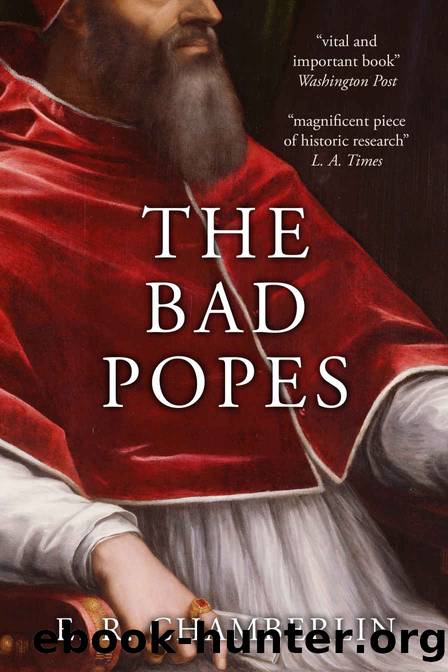The Bad Popes by Chamberlin E.R

Author:Chamberlin, E.R.
Language: eng
Format: epub
Publisher: Sapere Books
Published: 2020-07-18T16:00:00+00:00
Urban’s intransigence had in great part created the schism, but his death did not end it, for the two self-perpetuating, mutually exclusive, colleges of cardinals in Rome and Avignon each continued to elect a unique pope. The brief but violent reign of the Neapolitan bureaucrat had posed an unanswerable problem as to the nature of spiritual power, counterpart to the problem that Boniface VIII had posed. Boniface’s claim to universal temporal power had been answered — brutally and finally. Urban’s claim to universal spiritual power was inherited by his immediate successors in Rome, but the Avignonese counterclaim was never refuted, only ignored. Twenty years after his death the cardinals in Rome and Avignon, despairing of any other solution, united in council, deposed both popes, and elected a successor — but the problem was merely postponed.
As a result of the council, three popes now ruled where hitherto there had been but two. Which was the true pope? He elected in Avignon, he elected in Rome, or he elected by the council? What, for that matter, was an anti-pope? One who had not been canonically elected, the canonists replied. But what was a canonical election? Three hundred years earlier, in the dark days of the tenth century, a certain priest called Boniface Franco had murdered the reigning pope and had himself elected as Boniface VII. He then fled, returned, murdered the current occupant of the chair, and being of a legalistic turn of mind, carefully dated his reign from the first, not the second murder, thereby thrusting into legal oblivion the two popes who had reigned in the interim. Surely, of all popes, his election had been canonically suspect. Nevertheless, that great lawyer Benedict Gaetani had taken the style of Boniface VIII, thus tacitly recognizing the legality of Boniface VII. If such a man could be duly entered in the legitimate succession, on what grounds could the austere Benedict XIII, the Avignonese pope who succeeded Urban’s rival, be excluded?
Benedict saw no such grounds, and for twenty-seven years he held his own while seven rival popes elected by Rome or a council came and went. The French, as weary of the scandal as the rest, withdrew their obedience together with their financial support and he withdrew to Spain, ultimately ruling over a few square yards of territory. Staunchly convinced of his legitimacy to the end, he appointed four cardinals, who, entering into the spirit of the game, elected a successor on his death.
But long before Benedict’s death Europe had revolted, forcing the Papacy to bypass the obstacle that it could not surmount. At the Council of Constance in 1415, six European nations sat in judgment on the Papacy and forcibly deposed the reigning three popes: Benedict XIII; the “Roman” pope Gregory XII who saved his face by abdicating; and the bizarre figure of Baldassare Cossa — ex-pirate, ex-condottiero — who had somehow emerged as the choice of a previous council and taken the style of John XXIII.
But deposition was not enough unless there was unanimous choice of the successor.
Download
This site does not store any files on its server. We only index and link to content provided by other sites. Please contact the content providers to delete copyright contents if any and email us, we'll remove relevant links or contents immediately.
| Africa | Americas |
| Arctic & Antarctica | Asia |
| Australia & Oceania | Europe |
| Middle East | Russia |
| United States | World |
| Ancient Civilizations | Military |
| Historical Study & Educational Resources |
The Third Pole by Mark Synnott(677)
Money for Nothing by Thomas Levenson(626)
Christian Ethics by Wilkens Steve;(571)
The Economist (20210109) by calibre(566)
Made in China by Anna Qu(540)
100 Posters That Changed The World by Salter Colin T.;(498)
Reopening Muslim Minds by Mustafa Akyol(485)
Routledge Handbook of Contemporary India by Knut A. Jacobsen(477)
The Irish Buddhist by Alicia Turner(472)
Nonstate Warfare by Stephen Biddle(465)
Culture by Terry Eagleton(461)
The Great Pyramid Void Enigma by Scott Creighton(451)
The Age of Louis XIV: The Story of Civilization by Will Durant(440)
Ideology by Eagleton Terry;(436)
The Shortest History of China by Linda Jaivin(432)
Objects of Vision by Saab A. Joan;(426)
Banaras: CITY OF LIGHT by Diana L. Eck(424)
The Jews of Silence: A Personal Report on Soviet Jewry by Elie Wiesel(421)
Sybille Bedford by Selina Hastings(411)
